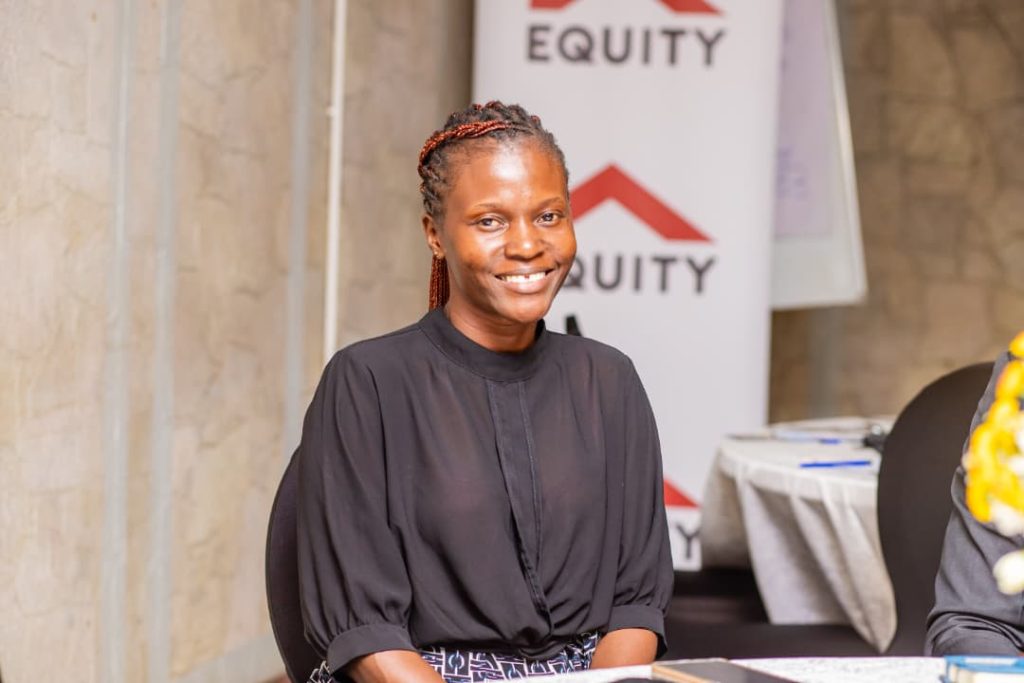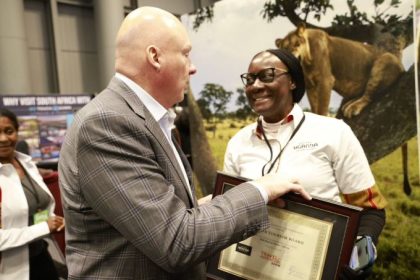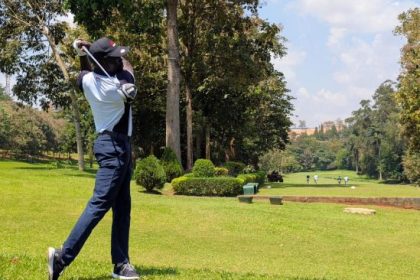From Sales Executive to Industrial Pioneer: Adong’s journey redefines women in Uganda’s manufacturing

Wearing a simple black top and skirt, Winfred Phiona Adong walked into Hotel Africana’s Ssezibwa Hall with quiet confidence. Her presence was understated but purposeful; the kind of composure that comes from navigating boardrooms and construction sites alike.
Adong, proprietor of Ayoma Manufacturing and Construction Company based in Soroti District, was among a select group of customers invited to Equity Bank’s Customer Service Week Stakeholder Breakfast on October 7, 2025. The engagement, themed “Listening to the Sound of the River,” was designed to draw direct feedback from clients, and Adong had a story that perfectly illustrated the kind of entrepreneurship Uganda’s regions are striving to nurture.
Her business journey began three years ago when she walked away from a comfortable sales job in Kampala’s corporate sector. “I’m a very ambitious person,” she recalls. “It was time to relocate and invest my skills in something that could create value at home.”
She returned to Soroti determined to start a manufacturing enterprise — a bold step into a field many women still shy away from. “A lot of women hesitate to enter male-dominated industries, but I wasn’t afraid,” she says.
The first challenge, predictably, was financing. “I tried several banks but got nowhere,” she notes. When she turned to Equity Bank, however, she found an institution willing to back her vision. With a UGX 300 million loan, she launched Ayoma Manufacturing and Construction Company in January this year.
Within months, Ayoma had delivered two major projects — state-of-the-art waterborne toilets at Queen Elizabeth National Park and staff accommodation facilities at Mount Elgon National Park, both completed by September 2025.
With construction operations gaining traction, Adong moved into a second venture — Ayoma Toilet Paper Industry Ltd, a small but fast-growing paper manufacturing unit. “Everyone uses toilet paper,” she says. “We saw a steady demand and decided to diversify into stationery as well.”
To sustain the expansion, she required a capital investment of $330,000, which she again sourced through Equity’s contract financing facility. The bank’s support allowed her to secure raw materials such as pulpwood and build operational capacity.
Equity Bank’s Executive Director, Claver Serumaga, says the bank is increasingly tailoring its support to long-term client growth. “We’re reorganizing how we engage customers — following up on their progress, providing additional capacity support, and financing expansion. As they grow, we also grow,” he said.
For Adong, that support has translated into tangible impact. Ayoma Manufacturing now employs dozens of casual workers — most of them single mothers — across Soroti and neighbouring districts. “I started small, but now I’m changing lives,” she says. “This work gives women income and dignity.”
Her products are already reaching Lira, Gulu, Mbale, and Jinja, with plans to extend distribution to Kampala. Ayoma’s next phase involves automating its production line and expanding into a full stationery product range.
Yet, like many local manufacturers, Adong faces structural challenges. She calls on the government to grant tax holidays to indigenous manufacturers, arguing that domestic investors often lack the incentives enjoyed by foreign-owned firms. “If the government supported local manufacturers with the same energy, we could transform communities faster,” she insists.
Her story captures a broader shift in Uganda’s industrial landscape — where regional entrepreneurs, backed by targeted financing, are beginning to redefine what homegrown manufacturing can look like.
“I wanted to build something from Soroti that could stand anywhere in the world,” she says. “Manufacturing isn’t just about machines — it’s about people, opportunity, and belief.”


 Equity Bank Uganda set to close 2025 on firmer footing as clean-up phase gives way to growth
Equity Bank Uganda set to close 2025 on firmer footing as clean-up phase gives way to growth
 USA–Canada certification dispute could expose Uganda and regional airlines to regulatory risk
USA–Canada certification dispute could expose Uganda and regional airlines to regulatory risk
 KPMG flags widening execution gap as tech leaders bet on AI maturity, talent and partnerships
KPMG flags widening execution gap as tech leaders bet on AI maturity, talent and partnerships
 Destination Uganda clinches “Best in Show – Africa” at New York Travel & Adventure Show
Destination Uganda clinches “Best in Show – Africa” at New York Travel & Adventure Show
 Uganda’s Kibirige edges closer to global golf stage after strong PGTI Q-School showing in India
Uganda’s Kibirige edges closer to global golf stage after strong PGTI Q-School showing in India
 Breathtaking Uganda unveils curated Easter getaway to Zanzibar
Breathtaking Uganda unveils curated Easter getaway to Zanzibar